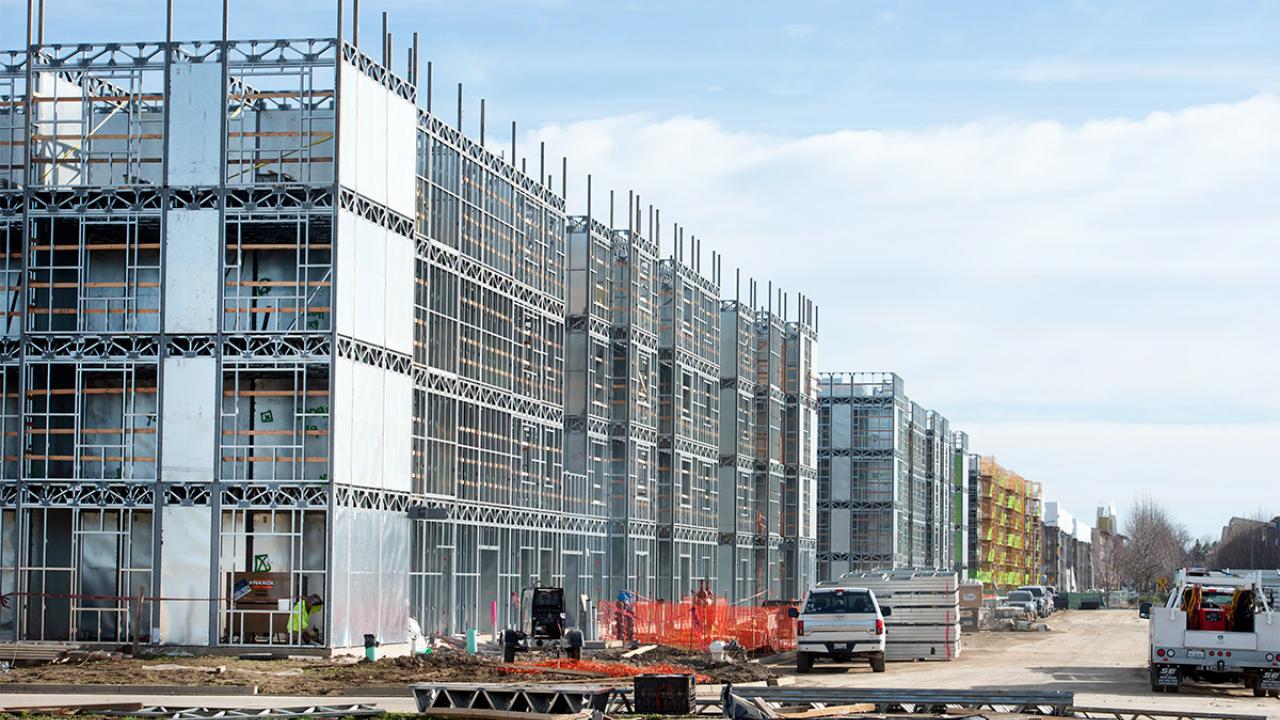Dateline UC Davis spoke with two campus officials about the concerns of a group of academic student employees (graduate students who work as teaching assistants) who declare on a website (“UC Davis 4 COLA”) that their “material situation is untenable” and are demanding, among other things, a cost-of-living adjustment of $1,553 a month and affordable housing for all graduate students.
The UC Davis action sprang up in support of some UC Santa Cruz graduate students, who in their own efforts to secure a COLA, started a wildcat strike in December, refusing to teach their classes and withholding grades.
Officials close to the situation at UC Davis include Jean-Pierre Delplanque, vice provost and dean of Graduate Studies; and Mike Sheehan, Student Affairs associate vice chancellor responsible for Student Housing and Dining Services.
How do you respond to graduate students who are having trouble making ends meet?

Vice Provost Delplanque: We certainly value the work of our graduate students — they are essential to our mission of teaching, research and public service — and acknowledge the difficult financial situation many of them find themselves in.
Our university has been making strides over the past decade to bring in graduate students who are representative of the changing population of California, so that if they elect to move into academia, we can have a faculty that can serve the needs of our student body. In fact, we are seeing more first-generation students coming here as grad students, many of whom may not have the privilege of family resources to back them up financially. We are actively working toward increasing the housing supply and taking other steps to help students with their basic needs to maintain equitable access to graduate school.
UC Davis 4 COLA has asked for a cost-of-living adjustment. What is the university’s response?
Delplanque: The University of California supports collective bargaining with its employees, and it’s a mischaracterization to say we are refusing to negotiate with the union (United Auto Workers) that represents our teaching assistants. In this case, the UC Office of the President — which handles collective bargaining — already negotiated a contract that the TAs approved in June 2018 and has about 2½ years to run. It provided a tuition waiver plus a $300 campus fee remission, 3 percent annual wage increases in line with other university employees, child care subsidy of $3,300 per year unique to TAs, one-time signing bonus and complete remission of health care premiums. See more information below on pay and benefits.
Do you know if our teaching assistants will join UC Santa Cruz TAs in withholding grades?
Delplanque: It’s difficult to tell at this time whether some of our TAs are withholding grades or plan to do so. But we have received emails from undergraduates expressing concern. It’s important to acknowledge the significant individual impact that such an action, even if it affects only a small number of graduate students, would have on some of them — those who are graduating, those who are applying for scholarships and fellowships, and more.
We are working with the Academic Senate, department chairs and other units on contingency plans to minimize the impact of grade-withholding on our undergraduate students.
But grade withholding should not be how we have a “conversation” with our graduate students.
What does the contract say about a strike?
Delplanque: In exchange for the pay and benefits I’ve already described, the university received a contractual promise that the TAs would not strike while the collective bargaining agreement was in effect through June 30, 2022. This is why UC Davis is focusing on other strategies to address the financial needs of our students.
MULTIFACETED STRATEGY
Associate Vice Chancellor Sheehan outlined the housing projects under construction and others that are coming soon:
- The Green at West Village — Under construction for transfer students and continuing undergraduate students, 1,000 beds opening fall 2020 and 2,300 more beds in fall 2021.
- Primero Grove — Repurposing 181 campus apartments for families and graduate students, opening fall 2021.
- Orchard Park — New construction (replacement project) for graduate students, 1,500 beds (including 200 two-bedroom apartments for families, and 1,100 beds for single graduate students), opening fall 2022.
- Shasta Hall — Under construction for undergraduates, 800 beds (an increase of 300 over the old Emerson Hall that was torn down to make room for Shasta), opening by 2022 (and potentially as early as fall 2021).
- Solano Park — Maintain all housing here until the new Orchard Park comes online. Then continue to maintain 120 apartments at Solano Park for the near future.
And one of those strategies is housing, correct?
Delplanque: Yes, in particular, the housing situation in Davis is compounded by the low vacancy rate and the higher rents that go with that.

Associate Vice Chancellor Sheehan: This is where we come in, with the most ambitious student housing plan in UC Davis history. This plan is quickly moving from dates on a page to beds in buildings. See box.
Delplanque: Yes, it’s important to remember, it takes time to develop plans and build housing. It does not happen in the short term.
Sheehan: Still, we’re doing everything we can to speed up the process and gain cost efficiency, like The Green at West Village, where we are using an efficient construction methodology that will allow us to have 1,000 beds come online in the fall of 2020. The first phase of The Green will house incoming transfer students. This increased inventory will have a direct impact on the rental supply in Davis.
For example, at the present time we have master leases for Davis apartments for 500 transfer students. When The Green opens, we will release those apartments back into the rental stock.
Couple this with a private apartment complex opening in Davis in the fall, and other projects in construction in the city, and we expect the vacancy rate to improve.
What about rents?
Sheehan: All of our current on-campus and near-campus family and graduate housing such as Solano Park, Russell Park, Atriums and 8th & Wake have rents that are currently below the averages in the Davis market, and the same is true for Primero Grove which houses transfer students at this time, but will be for families and graduate students starting in fall 2021. We will build the new Orchard Park as efficiently as possible to keep rents competitive, and cap the amount by which rents rise over time.
Are we helping students with their basic needs?
Delplanque: Our Aggie Compass Basic Needs Center is available to graduate students, as well as undergraduates, and we know that our Graduate Student Association has established a pantry for food-insecure students.
We also need to work collaboratively with students to persuade our legislators in Sacramento to advocate for more graduate student support.
How are we responding to campus protests?
Delplanque: Of course we respect the right of our students to express their opinions and concerns, and we are open to conversation at any time. We have a good relationship with the Graduate Student Association — that doesn’t mean they let us off easy, but we can talk, and we have, productively.
Pay and benefits
The UC Office of the President, on its information page about graduate student employees at UC and the current protests, gives the following data on graduate student pay and benefits.
UC’s academic graduate students work part-time and typically receive total annual funding packages that average $47,000, which include $22,000 in salary (on average), and reimbursements for tuition, health insurance premiums, fellowships and scholarships, and various campus fees. Salaries vary by discipline and location.
- Tuition — 100 percent reimbursement (approximately $13,000 depending on the campus)
- Health insurance premiums — 100 percent reimbursement (approximately $3,000-$5,000 depending on campus)
- Wage increases under four-year contract approved by the union in June 2018 — 3 percent annually over four years (a total wage increase of 12 percent)
- Child care subsidy — $3,300 per year (to be used at a facility of the employee’s choosing)
- Campus fee remission — $300 annually, to offset any additional fees
